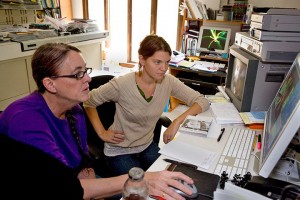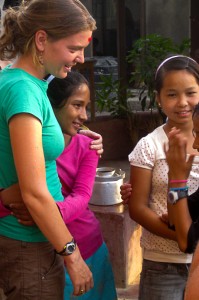I’ve been to dozens of screenings over the past year, at film festivals, schools and community gatherings around the country and everyone always asks the same thing: “What can I do? How can I get involved?” 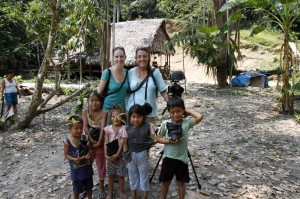 And that’s exactly what Erin and I hoped for when we created the film, that people would be inspired and moved to take action.
And that’s exactly what Erin and I hoped for when we created the film, that people would be inspired and moved to take action.
So, we have changed the Opening Our Eyes website so that we can help answer that question instead of being a dead end. I wanted the film to be a jumping off point for people to take action, but that would only happen if we could direct that energy into tangible ways.
We’ve set up a “take action” page, with three different sections on ways that you can help make a positive difference in your community or on a more global scale. You can “become the power of one” and find out how Maggie Doyne used her babysitting earnings to make a difference or find explore volunteer travel opportunities. You can “multiply the power of one” and donate to our subjects’ causes or find out about volunteering for them or you can host a screening of the film and “showcase the power of one.”
Every time I start to step away from this project, something happens to pull me back into it. So I suppose that this journey isn’t over. I continue to be amazed by the collective power we all have in making change happen and making our world the world we want to live in. I still remember what one of our subjects, Robbin Moulds told us one rainy day in Sydney, Australia. She said, “At 211 degrees water is hot. At 212 degrees it boils. That’s a one degree difference.”
I challenge you all – what’s a one degree difference you can make?
I’ve been to quite a few screenings over the past year of our feature documentary, Opening Our Eyes and it has been an interesting experience. What I love the most are the questions and comments that come up in the Q&A after the screening. The most asked question is “How did you pick your subjects for the film?”
I could write an entire bog about how we picked our subjects (and may have already), but the simple answer is that I sent out an email to everyone I knew asking them if they knew or knew of people – individuals – on all 6 continents – who were making a positive difference in the world. The response was overwhelming and I still have folders of subject ideas that I would love to do short stories about if I can find the funding and the time.
My daughter and I waited until we got back from our round-the-world trip to decide on our North American subject(s) and ended up shooting that segment 4 months later. Surely we were in a different frame of mind and it shows in the piece – it’s a big edgier and less optimistic, but then again it is a story about two women, Maureen Taylor and Marian Kramer, 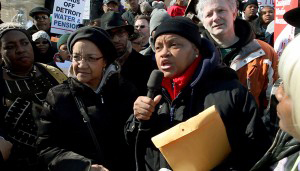 working against all odds in the inner city ravages of Detroit. They are volunteers and street activists – the “voice” for the poor and disadvantaged of their community.
working against all odds in the inner city ravages of Detroit. They are volunteers and street activists – the “voice” for the poor and disadvantaged of their community.
Many times when I’ve screened the film, folks want to know why I chose that story to be in the film and some tell me I should take it out – but I won’t. We have edited this segment when we cut the film from 76 minutes to 61 minutes. In the process, we “toned it down”, but I didn’t do that to appease the crowd, I did it because our subjects were good and caring women who were passionate about their cause and I wanted the audience to like them. I also wanted the audience to listen to what they were saying, rather than get defensive and tune them out.
Ultimately the Detroit segment has what every good story needs – conflict. But it also has hope for a better future. This segment is different from the other stories in the film, in that it’s not about giving children and teens a home, or rescuing food or saving the environment, but it is about something that is equally important and that is giving the people a “voice”. Without that, there is no hope for hundreds of thousands of disadvantaged people in America.
Being able to have our voice heard is perhaps the most important privilege we have as citizens of this country or any country for that matter. If our “voice” gets silenced, or restricted, the rest of our freedoms will be in danger. Maureen and Marian understand the importance of using their voice. I do as well, and that’s why that story “stays in the film”.
The best part about creating the documentary, Opening Our Eyes, was getting to be around some of the most amazing, inspirational people I’ve ever met in my life. So many things that these folks said during their interviews, still run through my mind on a daily basis.
One thing in particular was something that Maggie Doyne said when she was talking about what she built in Nepal “It’s not perfect. If I had waited for things to be perfect, none of this would have happened.”
I work and live with a perfectionist, my husband and my business partner. We are opposites in every way. I am one to take my “big idea” and jump right into it. I’m also one who wants to complete something and follow through right away, regardless if it’s “perfect” or not. For example: I could have/should have gotten this film professionally color graded before I sent it out to festivals and distributors. But, I didn’t have the funds to do that, so rather than let the film “get old” until I could get more funding (which may not have happened), I pushed it out to the universe, and good things have happened.
It’s good to be detail oriented and to strive for perfection, but not if you use it to give yourself reasons to stop yourself from moving forward. Many times, when I tell my husband my latest “big idea”, his first instincts are to tell me dozens of reasons I shouldn’t act on it until……………everything is perfect. His intentions are good – he wants to protect me from failure, but if I let it, his words might also end up protecting me from success.
We both recognize our differences now as our individual strengths and that when we listen, learn and balance those opinions and differences so that they can work together instead of opposed to each other, great things can happen. But that takes practice and also not having to be right all the time. There is no one “right” and that’s the beauty of collaboration and working in harmony.
“She’s from the mainland isn’t she?” the woman said as she got into my friend’s truck. I laughed and she said “I knew you weren’t from here when you said, “hi, I’m Gail and extended your hand” – “ we don’t do that here.” My good friend PF Bentley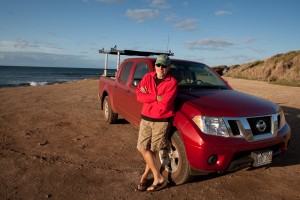 was driving me to the tiny island airport and he had stopped to pick up a couple of friends for a meeting they were going to attend after getting me on my way.
was driving me to the tiny island airport and he had stopped to pick up a couple of friends for a meeting they were going to attend after getting me on my way.
Last week, after getting an email from PF alerting me about incredible airfares to Hawaii ($425 roundtrip from Newark to Honolulu), I made an impulse decision, bought a ticket and here I was on the island of Molokai,  heading home after 4 days on the island. Some might say, that’s an awful long way to go for such a short time and I suppose that may be true. However it was 4 days that gave me a well needed break, and more importantly a time to step back from the noise of my life and ask myself “have I gotten off purpose?”
heading home after 4 days on the island. Some might say, that’s an awful long way to go for such a short time and I suppose that may be true. However it was 4 days that gave me a well needed break, and more importantly a time to step back from the noise of my life and ask myself “have I gotten off purpose?”
The fact is I had gotten way off purpose over the last few months. I had begun doing things other people wanted me to do and in the process I forgot who I was. When that happens, everything seems to turn sour and in the process I seem to do more “pushing” my dreams out there, and getting nowhere. Instead I should do what it is I am meant to do, regardless if people accept it or understand it and then things will fall into place as they should.
Over a decade ago, PF had taught me how to tell a story and how to translate that to “film”. If it weren’t for PF, our film, Opening Our Eyes would not have been possible. Thirteen years ago, he stirred something inside of me and I went from a state of stale complacency to an awakened spirit. 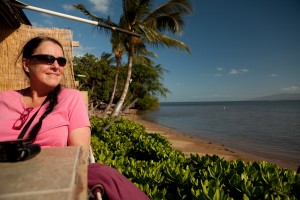 The spirit had always been inside of me, but I had begun not to listen to it.
The spirit had always been inside of me, but I had begun not to listen to it.
It’s been a short but glorious 4 days. PF and his beautiful wife Amy soothed my soul with humor, color, art, wonderful food  and love. Amy is one of the most creative people I have ever met and a true inspiration in many ways. She taught me the ukulele and we played and sang and laughed. PF taught me new technical skills – color grading and mixing sound, but he also showed me his island home and once again he awakened my spirit. Mahalo (thank you) Amy for bringing color to my life and thank you PF for once again getting my train back on track.
and love. Amy is one of the most creative people I have ever met and a true inspiration in many ways. She taught me the ukulele and we played and sang and laughed. PF taught me new technical skills – color grading and mixing sound, but he also showed me his island home and once again he awakened my spirit. Mahalo (thank you) Amy for bringing color to my life and thank you PF for once again getting my train back on track.
I think sometimes we kid ourselves when we don’t recognize that certain things we do or say are mild forms of discrimination. There’s the occasional “soccer mom” comment that’s not intended to marginalize women or the references about “those people”. Many times the worst offenders are the ones who aren’t even aware they do discriminate.
I’ve spent my life and career as a woman in a man’s business. I’ve heard all the remarks that I care to hear and the bias that comes with it. Things have certainly improved over the last 35 years but now I’m facing a different sort of discrimination and that is the prevalent disregard for someone who is “old”.
When people equate youth, (defined by age) 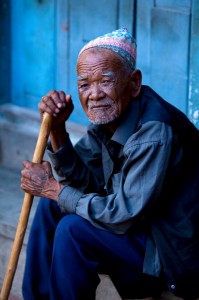 as someone who has new or fresh ideas and old as someone who is set in their ways and stagnant, that is a form of discrimination. In America we have become obsessed with youth and looks to the point that we don’t value anyone over 40. We not only don’t think this generation of aging baby boomers is relevant or has value, but we seem to be angry that they should have a right to things like social security or pensions or even a job. We want them just to go away and become invisible. We are a culture that places importance on the “packaging and the fizz”.
as someone who has new or fresh ideas and old as someone who is set in their ways and stagnant, that is a form of discrimination. In America we have become obsessed with youth and looks to the point that we don’t value anyone over 40. We not only don’t think this generation of aging baby boomers is relevant or has value, but we seem to be angry that they should have a right to things like social security or pensions or even a job. We want them just to go away and become invisible. We are a culture that places importance on the “packaging and the fizz”.
The fact of the matter is that age really has nothing to do with wisdom at all. Just because you get older doesn’t mean you necessarily get wiser. And just because you’re younger doesn’t mean you’re someone with forward thinking ideas. I’ve met a lot of older people who aren’t wise at all and I’ve met people half my age that couldn’t come up with a fresh thought if their life depended on it.
Age isn’t a barometer for how you process ideas. Look at people like Clint Eastwood – he did his best and most creative work after he turned 65. (I’ll forgive him for the chair incident.) I’d like to think that one of the best things that came out of this project that I did with my daughter was that we both had a much better understanding of who were as people. I wasn’t just her “old” mom who didn’t know anything and she wasn’t just my “kid” who didn’t know anything.
So next time you find yourself equating age with how someone thinks – step back and recognize that subtle discrimination and ask yourself if you would like to be on the receiving end of that?
We honor Dr. Martin Luther King Jr. today. Much has been written about King, but most of my impressions of this great man were made when I was a young teenager. I remember many of his great speeches and his marches, but what I remember most is thinking – how could one man be so full of love amongst all the hate in the world.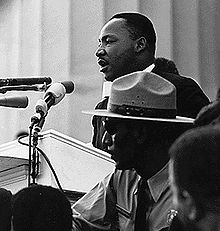 It was a tumultuous time in America, a time when the country was deeply divided by race and the Vietnam War and yet King was so full of love.
It was a tumultuous time in America, a time when the country was deeply divided by race and the Vietnam War and yet King was so full of love.
Dr. King was a gifted orator and I could fill endless pages with quotes, but I’ll site a couple that stand out to me:
“I have decided to stick to love…Hate is too great a burden to bear.”
And
“Forgiveness is not an occasional act, it is a constant attitude.”
These both go hand in hand because if we can’t forgive, whether it be the people who have hurt us or ourselves for the hurt that we’ve inflicted upon others, we will continue to harbor hate inside. I agree with King that it’s far better to stick to love because hate is too great a burden to bear.
It’s hard to forgive. To be able to forgive, one must come to terms with what or who has caused your heart to fill with hate or resentment. Sometimes in our attempts to bury our pain, we try to dismiss or deny that it’s there. But that doesn’t free our souls from the negative energy that hatred breeds – it only buries it deep inside us and consumes our spirit.
To “stick with love” is to recognize that humans are not perfect and when someone portrays their “ugly” side, which is generated by ego and fear that ultimately it’s better to see past the ugliness and notice the good. The funny thing about love is that when one person starts by treating another person with love instead of contempt, it gets paid forward and the love spreads.
“Hatred paralyzes life; love releases it. Hatred confuses life; love harmonizes it. Hatred darkens life; love illuminates it.”
Dr. Martin Luther King Jr.
“This could be one of those rare moments in life when you can go back in your past and make things right for your future.”
I was in NYC last night and I saw this sign in a shop window. It wasn’t a big sign, but nevertheless it caught my eye and stopped 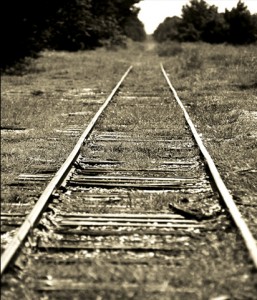 me in my tracks. It was the second time this week that I had seen that very same phrase written. How odd and what an uncanny coincidence to see these same words written in two totally random places, in the same week. I thought, “if only it were true”.
me in my tracks. It was the second time this week that I had seen that very same phrase written. How odd and what an uncanny coincidence to see these same words written in two totally random places, in the same week. I thought, “if only it were true”.
It’s not possible to change the past of course, but I started thinking about it and what I would change, if I could. There were lots of things that came to mind immediately, that in hindsight I might have done differently. But when I really started thinking of things that I’ve done in the past, in terms of what I would change to “make things right for my future”, there were only a couple of changes I would make.
The fact is that even the things that I wish I could change the most, probably had to happen for one reason or another in order to have a brighter future. We can’t change the past, but we can learn from it.
One thing I love about the New Year is that it gives me a feeling of renewed hope and that we all have a fresh start to “get it right” in the coming year. I’m not one to make grandiose resolutions because they leave me feeling like a big loser weeks later if or when I falter. I’d rather simply focus on each new day and be the best I can be.
I am not perfect and I never will be. I am a work in progress and each day, week, month and year I strive to be true to who I am and not let others deter me from my purpose. I will try to remember that no one can really change the past but we can let go of it. But “letting go” is not trying to erase the past. Attempting to do that really only harbors negative energy inside. The very act of trying to repress or block something from your past is in fact the opposite of “letting go”. To really “let go” is to be able to forgive yourself (or others) from past mistakes, and move forward in a positive way. I try to embrace each new day, and give it and everyone I know the opportunity to “make things right for the future”. I can only hope that others will do the same. Imagine the power in that thought.
Be kind, be loving, and focus on the best in others – not the worst, because isn’t that what you’d like others to do for you? When you start to live life this way, you’ll probably never even have the desire to want to go back and change your past.
Once again, I try to make sense of another senseless act of violence – this time one that snuffed out the lives of 20 innocent children. Every time there is another tragedy caused by guns, we question our firearms laws and vow to do something about the “problem”. The usual discussion takes place with lots of talk on both sides of the issue and then dissipates – until the next tragedy.
I think the “problem” goes beyond the discussion of a “right to bear arms”. I think it speaks to a greater problem and that is how we deal with our fellow man.
Too often we judge others without knowing much about their circumstances. Too often we seek to be understood but don’t place importance on seeking to understand someone else. I think this happens when we become too insular – when we don’t allow ourselves to become in tune to the rest of the world or even our own communities.
Some simple thoughts on how we can become more compassionate:
- Seek to understand – not just to be understood. I wish I had a dollar every time someone said to me “my point is…….” – I would be rich. Every time you are tempted to make “your” point – also make an attempt to understand someone else’s.
- Learn to forgive – Human beings are far from perfect. They do things and say things they usually wish they hadn’t. When we forgive others for the hurt they’ve done to us, we free ourselves from the pain as well. When we don’t forgive, we keep the negativity inside. It ends up consuming us. Try forgiveness instead.
- Don’t judge others – There’s an old saying “people who live in glass houses, shouldn’t throw rocks”. Don’t judge others unless you want to be judged by them.
- Don’t bully – There are many ways people bully – it’s not always overt. Bullying really means forcing your way on someone else. When you ignore someone, you are being just as much of a bully as someone who is more aggressive. Essentially, you are no different in how you go about “getting your way”.
- Treat people how you would like to be treated. Stop and think before you speak and act. Would you like to be treated that way. I’ve never liked cliques for this reason. There’s always an exclusionary aspect to a clique. There’s always judgments being made about who should and shouldn’t belong.
- Do things for someone without the expectation of return. The rewards of giving are just that – the act of giving itself is the biggest reward you give yourself. When you do something and expect something in return and it doesn’t happen – it takes away the joy of giving.
- How many times have you told yourself that you will be more caring and giving? And how many times do you let that thought slip into oblivion without acting on it. Next time you say that – follow through.
- Every simple act of kindness adds up. Imagine if we all did something kind for someone every day. Just imagine.
- Look past the someone’s exterior. It’s hard sometimes to look past the actions of someone. We end up questioning and taking things personally when in fact many times someone’s actions have nothing to do with us
- Live a compassionate life and teach your children through your actions what that means. It starts there. Showing compassion is one of the best ways to make our world a better place. You will set an example for your children and they will pass that along to future generations.
What are other ways we can be compassionate?
“Compassion and happiness are not a sign of weakness but a sign of strength.” ~Dalai Lama
A couple of months ago, I was one of the trip leaders for a group of high school exchange students traveling to Colorado. 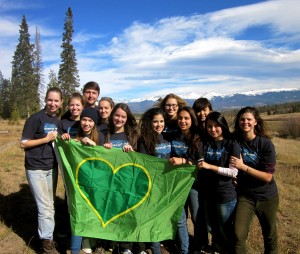 These students are here for the year and had arrived in early fall. They were placed with host families all over the country, but they had decided to go on one of the trips that CCI Greenheart, their exchange sponsor organization (and where I work), offers throughout the year. The trips are a mix of fun activities and volunteering, where they can learn about community service and meet other exchange students from around the globe. This particular trip was to Snow Mountain Ranch in Granby, CO, up in the mountains outside of Denver. And I was lucky enough to be selected as one of the people to lead the trip.
These students are here for the year and had arrived in early fall. They were placed with host families all over the country, but they had decided to go on one of the trips that CCI Greenheart, their exchange sponsor organization (and where I work), offers throughout the year. The trips are a mix of fun activities and volunteering, where they can learn about community service and meet other exchange students from around the globe. This particular trip was to Snow Mountain Ranch in Granby, CO, up in the mountains outside of Denver. And I was lucky enough to be selected as one of the people to lead the trip.
Every day was packed with activities. Each morning we would hike up into the mountains to take in the beautiful scenery, and after lunch we would do a volunteer project or other fun activity like zip lining. In the evenings, we would have workshops where we would talk about what it means to be a volunteer and how we can get involved in our communities.
One of the nights, we showed the film. This was a new experience for me, as I had not yet been present for a screening of the film to such a young audience. I realized, as I sat there watching with the students, that this was one of our target audiences. These were the types of people that we most wanted to reach – the young people who have the energy, optimism and lives ahead of them to create their own path and make a difference in what they’re passionate about. Not only that, but they were also an international audience. They represented 9 different countries, 9 different places where they could spread the messages of the film. I felt a little nervous as I waited for the film to end, anxious to hear their comments.
After the film ended, we sat in a circle and I asked some discussion questions. What traits did the subjects share? What were some of the challenges they faced and how did they overcome them? What was the role of the volunteer in some of these stories and how much did the subjects depend on them? They had some good answers, but it wasn’t until I asked each of them to say two words about how the film made them feel that the best thoughts were shared. Here are some of my favorites:
“I would say ambitious and proud. I’m proud of just knowing that people in the world are doing things like that.” – Yumna (Morocco)
“It makes me feel like I have the right ideas.” – Oleksandra (Ukraine)
“Thoughtful because it makes me think about it, and also have motivation and courage to start something. If people like that can do it, why can’t I? I mean, anyone can do it if you have the courage.” – Maxime (Switzerland)
“Kind of amazed because you don’t really see that around my area and it kind of makes me think about my future and things that I can do, and I want to do something.” – Lorraine (Upstate NY)
“Hopeful and unbelievable. You just live only once.” – Gulzhan (Kazakhstan)
It was an honor to show the film to such a bright group of motivated people from around the world, ready to make a difference. That is what it’s all about.
“My Voice” and not being afraid to use it. To be truthful, there are plenty of times that I’m afraid to exercise my voice, but I am much more fearful of the consequences if I don’t. There have been times when I have distanced friends or made colleagues step away from me because I have spoken up for what I feel is the right thing to do.  It is never easy but I would rather live in a world where I fight to give my protagonists the right to exercise their voices, rather than be quieted by them.
It is never easy but I would rather live in a world where I fight to give my protagonists the right to exercise their voices, rather than be quieted by them.
To be born at a time in America when all it’s people had a shot at the “American Dream”. Sadly, that has changed over the last 40-50 years. It used to be if you got an education and worked hard, you could provide for yourself and your family. That dream has become harder and harder to achieve as the gap between the “have’s” and “have not’s“ has widened. How much wealth and power is enough for the smallest percentage of Americans? And why does it come at the cost of so many? I am a true patriot of this country because I still believe that we can get back to the beliefs and principles that our country’s founders held true.
My health even though I pray each day that I remain healthy. Even though I spend a small fortune for my annual health insurance premium, it comes with a very high deductible. Because of the high deductible, it’s really catastrophe insurance and in paying the rising costs of those annual premiums, I find it very hard at times to find the necessary funds to cover the out of pocket costs for preventative care. How does that make sense in a civilized country – that only the very wealthy or the ones lucky enough to still have benefits at work can afford to maintain their health?
My family and friends. I have come to learn the true importance of having a family and a handful of friends that I know I can really count on to always be there for me. We may disagree at times and even become estranged, but it’s those “real” relationships that have weathered the ups and the downs and are my foundation.
That I have shelter, food and other basic human needs because so many people don’t. I have traveled far and wide throughout my entire life and have seen the desperate situations that some people have to live with in all corners of the world. But I don’t have to go far anymore to see first hand, homeless people and hungry children. It’s so easy to turn a blind eye to those in need and make judgments about how those folks got to that point. It’s so easy to tell yourself that there is nothing you can do about that and that you can’t possibly help all those people. But it’s really not that difficult to do even the simplest of kind acts for somebody who doesn’t have as much as you. Try it and in doing so you get so much more in return.
My vision and that I’m bold enough at times to trust it . Sometimes, it is far too easy to follow the trends and think that is the safest route to take, but in the process you end up robbing yourself from who you really are and have to offer. Whenever, I have looked into my heart and followed my path, good things follow. It may not happen immediately, and along the way the “misses” sometimes are more than the “hits”, but I know if I stay on course, it will lead to what I am meant to do.
What are your thankful for this Thanksgiving?
